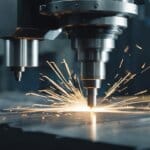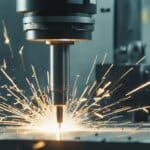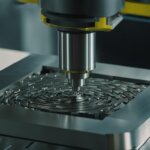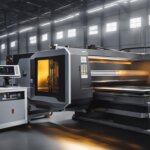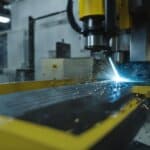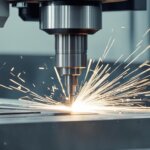Table of Contents
In today’s fast-paced manufacturing industry, precision and efficiency are of utmost importance. This is where computer numerical control (CNC) comes in. CNC is a technology that has revolutionized precision manufacturing, allowing for automated and highly accurate machining of complex parts.
In its simplest form, CNC involves using a computer program to control the movement and operation of machine tools. This allows for the creation of parts with extreme precision and consistency, leading to enhanced quality control and increased productivity.
This section will provide an overview of computer numerical control basics and its applications in precision manufacturing and automation.
Key Takeaways
- CNC involves using a computer program to control machine tools.
- CNC technology enables highly accurate and consistent machining processes.
- CNC plays a crucial role in precision manufacturing and automation.
- CNC technology offers several advantages, including increased productivity and quality control.
- Implementing CNC automation can result in decreased setup times and reduced human error.
What is Computer Numerical Control (CNC)?
In manufacturing, computer numerical control (CNC) refers to the automation of machine tools through the use of computers to execute pre-programmed sequences of machine control commands. CNC systems are designed to automate machining operations with great precision, speed, and repeatability.
CNC machines are used in a vast range of applications, from household items to complex aerospace parts, which can be produced with higher levels of accuracy, greater efficiency, and lower cost. The key components of a CNC system include a machine tool, a controller unit and a programming device.
The system receives digital instructions from a programme, which outlines a sequence of movements that the machine must undertake to forge a specific item. The CNC machine then uses the instructions to control a range of motion aspects, such as speed, location, depth, and tool selection. CNC programming sequences can be altered with minimal effort and can be easily reused, accelerating development cycles and boosting productivity.
The ability to automate machining processes with CNC systems has resulted in the creation of more sophisticated machines that require less human intervention than their manual counterparts, providing economical and manufacturing advantages. Indeed, the use of CNC automation is a fundamental factor in modern manufacturing processes and is being used to optimize output and enhance the quality of final products across industry sectors.
The Role of CNC in Precision Manufacturing
Precision manufacturing demands high accuracy, consistency, and repeatability in producing complex and intricate parts with tight tolerances. Computer numerical control (CNC) underpins the efficiency and reliability of precision manufacturing. CNC refers to the autonomous control of machine tools and equipment via pre-programmed software, enabling high-speed and precise machining operations.
CNCs are vital for delivering the high levels of accuracy expected in precision manufacturing. They can operate at very high speeds while still providing superior accuracy, which is typically unattainable through manual methods. With CNC technology, manufacturers can achieve greater precision in cutting, drilling, milling, turning, and other machining operations, producing high-quality parts with more uniformity and consistency.
CNC systems offer significant advantages in quality control, as they allow for automated inspection and measurement of parts, reducing the potential for errors. By programming the CNCs, manufacturers can establish strict tolerancing requirements, leading to higher quality products. And, with CNCs, manufacturers can produce parts faster and more efficiently than with manual methods, leading to increased productivity and cost-effectiveness.
“Computer numerical control (CNC) is a game-changer in precision manufacturing, providing enhanced productivity, consistency, and accuracy. The ability to program CNCs enables manufacturers to produce parts with tight tolerances, ensuring high quality and reliability. CNCs also provide a measurable impact on productivity, enabling increased speed and efficiency in manufacturing operations, leading to greater cost-effectiveness.”
Advantages of CNC Automation
Implementing Computer Numerical Control (CNC) automation in manufacturing processes offers several advantages over traditional manual methods. One of the most significant benefits of CNC automation is the elimination of human error. CNC systems allow for precise and accurate execution of manufacturing processes, reducing errors caused by human intervention. This leads to increased product quality and consistency, as well as reduced waste and cost. Additionally, CNC automation results in significant time savings, increasing production speeds and reducing setup times, thereby contributing to improved efficiency and productivity.
CNC systems also offer flexibility and versatility, as they can be quickly reprogrammed to accommodate different products and variations. This enables manufacturers to adapt to changing market demands and produce customised products at a lower cost.
Overall, the advantages of CNC automation in manufacturing include:
| Advantages of CNC Automation | |
|---|---|
| Elimination of human error | Increased accuracy and consistency |
| Reduced setup times | Increased production speeds and efficiency |
| Flexibility and versatility | Quick reprogramming for different products and variations |
CNC automation offers numerous benefits for manufacturers seeking to improve product quality, reduce costs, and increase efficiency. By harnessing the power of CNC technology, manufacturers can achieve higher levels of precision and productivity, positioning themselves for success in a competitive marketplace.
Conclusion
In conclusion, this article has provided an overview of computer numerical control, commonly known as CNC, and its importance in precision manufacturing and automation. CNC systems are instrumental in modern manufacturing operations, allowing for greater precision, efficiency, and repeatability. By harnessing CNC technology, manufacturers can enhance their production capabilities and achieve higher levels of accuracy, efficiency and productivity.
In summary, CNC automation offers numerous advantages, such as the elimination of human error, increased production speeds, and reduced setup times. CNC also improves quality control and offers flexibility and versatility in manufacturing processes.
Overall, CNC provides the foundation for precision manufacturing, enabling the creation of complex and intricate parts with tight tolerances. With the increasing demand for high-quality products and production efficiency, CNC has become essential to maintain a competitive edge. As such, it is crucial to stay up-to-date with the latest advancements in CNC technology to keep pace with the ever-evolving manufacturing landscape.
FAQ
What is computer numerical control (CNC)?
Computer numerical control (CNC) is a technology that utilizes computer programs to control and automate machining processes. It involves the use of pre-programmed software to dictate the movement and operation of machinery, such as lathes, mills, and routers, in order to produce highly precise and accurate parts.
How does CNC automation work?
CNC automation works by converting digital instructions, typically in the form of G-code, into precise movements of the machinery. The CNC system interprets the code and coordinates the positioning, cutting, and shaping of the material to achieve the desired outcome. This automation enables manufacturers to achieve consistent and repeatable results with minimal human intervention.
What is the role of CNC in precision manufacturing?
CNC plays a vital role in precision manufacturing by enabling the production of intricate and complex parts with incredibly tight tolerances. CNC technology facilitates the creation of intricate geometries, precise cuts, and smooth finishes that may be impossible or highly challenging to achieve manually. This contributes to improved product quality, consistency, and overall manufacturing efficiency.
What are the advantages of CNC automation?
CNC automation offers numerous advantages in manufacturing processes. Firstly, it eliminates human error, as the machines are programmed to execute operations accurately and consistently. Secondly, it improves production speeds by reducing setup times and allowing for continuous machining. Lastly, CNC systems provide flexibility and versatility, enabling manufacturers to easily reprogram and adapt the machines for different parts and applications.
How does CNC benefit overall productivity and cost-effectiveness?
CNC technology significantly enhances overall productivity and cost-effectiveness in manufacturing. By automating processes, CNC systems reduce the time required to complete tasks and increase production rates. This results in higher output and improved efficiency. Additionally, the precision and accuracy of CNC machining eliminate or minimize material waste and rework, reducing costs in the long run.


